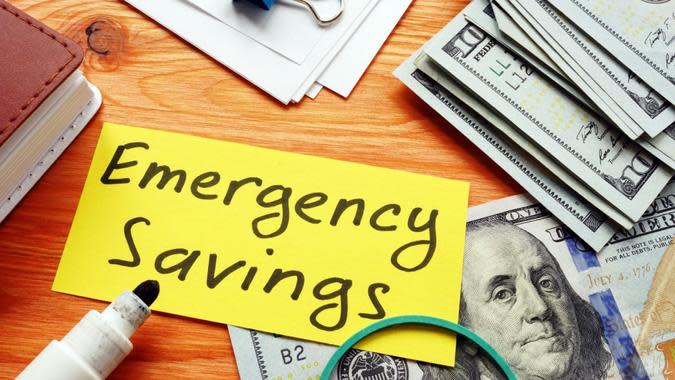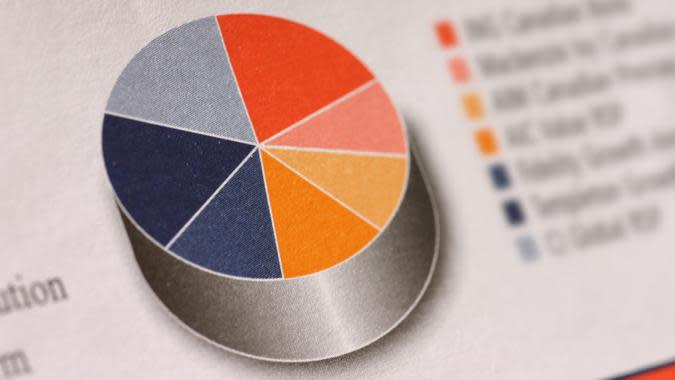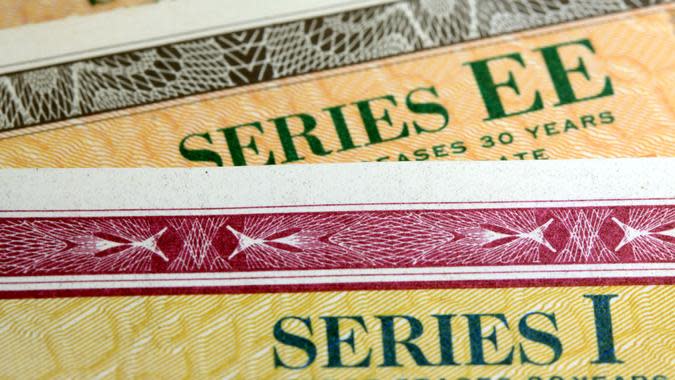50 Money Moves You Must Make Throughout Every Decade of Life

Every decade offers individuals the opportunity to level up their finances and build wealth. Whether you’re just starting out your investing journey in your 20s or preparing to retire in your 60s, making calculated money moves pays off in the short and long term to reach financial freedom.
Learn More: Shark Tank’ Star Kevin O’Leary: My Morning Habit That Keeps Me From ‘Losing Money 100% of the Time’
Read Next: 5 Genius Things All Wealthy People Do With Their Money
Keep reading to find out which money moves are essential to make in every decade of your life.

20s: Establish Emergency Fund
One of the first financial moves to make in your 20s should be establishing an emergency fund. Consider ensuring this fund has three to six months’ worth of expenses covered in it, in the event of unforeseen circumstances like sudden job loss or a medical emergency.
Tyler Meyer, CFP and founder of Retire To Abundance, said those who build an emergency fund early on create a financial safety net. This helps cover unexpected expenses without resorting to getting into high-interest debt.
Find Out: 7 Things To Know If You Withdraw More Than $10,000 From Your Checking Account
Be Aware: I’m a Bank Teller: 3 Times You Should Never Ask For $100 Bills at the Bank

20s: Budget
One of the best ways you can track your spending and start building wealth early on is by budgeting.
If you’re not sure where to start with your budget, consider using the 50/30/20 rule. This guideline allows you to allocate a percentage of your monthly income into essential expenses (50%), wants (30%) and savings (20%).
For You: Warren Buffett’s Parenting Rule: The Key to Raising Money-Savvy Kids

20s: Start Investing
“Beginning to invest in your 20s allows for long-term growth potential, harnessing the power of compounding interest to build wealth over time,” Meyer said.

20s: Focus on Career Development
You might start your career in an entry-level position, but you can (and should) use your 20s to make career development moves that will increase your earning potential later on.
A few areas to consider investing in, as recommended by Meyer, include your education, skill-building and networking.

20s: Start Your Retirement Savings
It’s never too early to start saving for retirement. Tiana Patillo, CFP and financial advisor manager at Vanguard, recommends starting with your employer-sponsored retirement plan.
“Contribute at least enough to receive your employer match. The goal is to save 12% to 15% of your income, and or max out, if your budget allows.”

20s: Automate Your Finances
If you tend to forget about due dates for bills or other important payments, consider automating bill pay to keep from falling behind.
Similarly, you may decide to automate sending money to your investment account from your paycheck to ensure good consistent investing practices.
Discover More: Warren Buffett: 6 Best Pieces of Money Advice for the Middle Class

20s: Invest In Your Financial Education
What don’t you know about money? Invest in your financial education, such as buying a book or attending a workshop about financial topics where you lack expertise.
As you learn more, you’ll feel confident and empowered to make the right financial decisions.

30s: Increase Retirement Contributions
As you start to earn more money in your 30s, Meyer recommends increasing your retirement contributions. Doing so, he said, ensures continued progress toward long-term financial goals and retirement readiness.

30s: Create Good Financial Habits
Besides creating and sticking to a budget, Patillo also recommends the following good financial habits:
Staying out of the high-interest debt cycle
Paying the minimum on all debt
Creating a contingency fund for emergencies
“If you don’t establish good habits now, you may struggle in the future,” she said.

30s: Top Off Your Emergency Fund
Did you recently withdraw some savings from your emergency fund to pay for a surprise bill? Make sure to return to this fund and replenish the account.
Find Out: 9 Bills Frugal People Don’t Pay

30s: Pay Down Debt
If you’re carrying debt in your 30s, like credit cards or student loans, this is the decade to pay it off in full.
“Prioritizing debt repayment reduces financial stress and interest costs and frees up funds for other financial goals and opportunities,” Meyer said.

30s: Get Your Credit Score Above 800
This bit of financial advice comes from money expert Humphrey Yang who said reaching a credit score of 800, or higher, is a money milestone to achieve in your 30s.
Having a great credit score, Yang said, gives you a lower interest rate when you’re trying to buy your first home. If you already own a home, it may help refinance a mortgage at a lower interest rate.

30s: Save 3x Your Yearly Salary
This is another money move to start making in your 30s. By age 40, Yang recommends having at least three times your yearly earnings saved up.
If possible, try to save four to six times that amount to enjoy gains and interest over the decades to come while staying on track for retirement.

30s: Don’t Live Beyond Your Means
Even if it seems like everyone on Instagram is taking vacations or buying new cars all the time, resist giving in to lifestyle creep or overspending to keep up with the Joneses.
Explore More: 6 Money Moves To Make When Your 401(k) Hits $1 Million

30s: Have a 529 Plan
Do you have children or plan to have children? Yang recommends getting a 529 plan to help cover their education costs. When the funds are properly used, recipients will be able to enjoy flexibility with account rollovers and state tax advantages.

30s: Review Insurance Needs
Your 30s are a good decade to start reviewing your insurance needs.
Meyer recommends accessing life, health, disability and property insurance coverage. This coverage ensures adequate protection for unforeseen events and liabilities.

30s: Set Clear Financial Goals
Do you want to buy a house? Raise a family? Get married? Want to pay off debt?
Use this decade to start setting clear financial goals. Doing so, Meyer said, provides direction and motivation, guiding financial decisions and prioritization of resources.

30s: Become an Expert in the Value of Compounding
If you started investing in your 20s, you may already be familiar with the power of compound interest.
Jan Blakeley Holman, CFP and director of advisor education at Thornburg Investment Management, uses the example that you have a choice of working 35 days with a pay of $1,000 per day or working for a penny the first day and doubling that amount each day for 35 days.
“If you chose the first option, you’d have $35,000 at the end of 35 days, and if you chose the second option, you’d have $343,597,383.68,” she said. “Each day, the pennies you’re receiving are compounding by 100% and being added to what’s already there.”
Trending Now: Net Worth for US Families: How To Tell if You’re Poor, Middle Class, Upper Middle Class or Rich

30s: Invest In High Risk/High Growth Stocks
John Stevenson, CFF and expert contributor for Annuity.org, recommends keeping most, if not all, of your investable assets in high risk/high growth stocks for maximum returns when you’re in your 20s through 40s.
“At this point, a market downturn is not going to harm your retirement,” Stevenson said. “It will only help with dollar cost averaging as you invest for your future.”

30s: Buy Life Insurance
If you do decide you want life insurance coverage, buy it. This type of coverage is especially critical for those in their 30s with a spouse and children to protect from serious financial losses and provide them with financial security if something should happen to you.

40s: Diversify Investments
“Diversifying investment portfolios minimizes risk and enhances returns, ensuring a balanced approach to wealth accumulation and preservation,” Meyer said.

40s: Make Use of Dollar-Cost Averaging and Systematic Investing
What do these two concepts mean? Holman said those who make use of dollar-cost averaging end up with investments that have a lower cost basis than the prevailing market price.
Systematic investing, she said, eases large investment amounts into securities that fluctuate in price.
“With a systematic exchange approach, you can put a lump sum into some liquid account that pays interest and schedules withdrawals of a smaller amount of the lump sum to be invested in the market on a regular basis.”
Find Out: Rich Dad’ Robert Kiyosaki Reveals Why the 401(k) Is a ‘Horrible’ Retirement Plan

40s: Invest To Reach Short-Term Goals
Did you know investing can help you reach short-term goals like planning a wedding or buying a new car?
If you have a short-term goal in mind, Patillo recommends speaking with a financial advisor to gauge the type of investments you should use to reach each of your goals.

40s: Build a Financial Cushion
Building wealth means doing more than keeping an emergency fund in place. You should also have a financial cushion built up in the bank in your 40s. Ideally, these funds should also be kept in a high-yield savings account.

40s: Put Bonuses Toward Your Retirement Savings
Technically, you can start doing this at any age but let’s consider the possibility that you might have used workplace bonuses you received in previous decades for other functions like paying off debt. Any bonuses you receive at work in your 40s may have a portion, or the entire amount, put towards your retirement savings.

40s: Avoid Get-Rich-Quick Schemes
As tempting as it can sound to invest in something trendy or cool you don’t know much about, don’t let your emotions sway your investing habits. Stand by your consistently sound financial habits.
Be Aware: How Much Household Income Will Be Considered Upper Middle Class in 5 Years?

40s: Update Estate Planning
Use this decade to review various estate planning documents, like wills, trusts and beneficiaries. Doing so, Meyer said, will ensure alignment with current goals and circumstances.

40s: Reassess Career Trajectory
How is your career journey going so far? Do you want to enhance any of your existing skill sets? Transition to another career or line of work? Explore starting a small business or becoming an entrepreneur?
Meyer recommends conducting a mid-career evaluation in your 40s to allow for adjustments to your career trajectory.

40s: Prioritize Health and Wellness
“Investing in health and wellness through preventive care, exercise and stress management promotes longevity and reduces healthcare costs in the long run,” Meyer said.

50s: Make Catch-Up Contributions
Once you’re about 10 to 15 years out from retirement, Patillo recommends using this time to make catch-up contributions toward your retirement savings.
“At this point, you may be more established in your career and able to put away more money towards retirement,” Patillo said. “If you had a slow start, consider ramping up contributions to your retirement accounts.”
Remember, limits will vary based on your age and the calendar year.
Read Next: 7 Ways the Upper Middle Class Can Become Rich in 2024

50s: Avoid Getting Into Debt
If you already worked hard to aggressively pay off your debt in full, great! Be careful to avoid taking on any new debt once you’re in your 50s.
You’ll want to spend this decade growing your money and savings the closer you get to retirement.

50s: Create a Tax Strategy
Justin Pritchard, CFP and founder of Approach Financial, previously told GOBankingRates that it’s a good idea to start considering different types of investment options in your 50s. A few examples include a Roth 401(k) and a backdoor Roth IRA.
“Look at the tax status of all of your retirement savings and run some projections to see how that’s going to work for you. If you’ve saved everything in pre-tax accounts, you could have issues down the road,” Pritchard said.

50s: Avoid Scams
Being in your 50s with substantial savings, unfortunately, makes you the ideal target for scammers.
Learn how to spot the anatomy of a scam, from common things scammers will tell you or things they will tell you to do, with the help of trusted resources like the Federal Trade Commission (FTC).

50s: Understand Asset Allocation
Brian Minogue, CFP and founder of Kardinal Financial, previously told GOBankingRates that you should have a good idea of what makes up your asset allocation (a mix of stocks, bonds and other assets) and how this allocation has performed historically by the time you’re in your 50s.
According to Minogue, this allows 50-somethings to better plan for any risks that may impact their investment portfolios.
Trending Now: What Income Level Is Considered Middle Class in Your State?

50s: Develop a Retirement Income Strategy
Typically, most retirees need more than Social Security to fund their retirement years.
Meyer recommends putting together a retirement income plan in your 50s. This helps ensure sustainable withdrawals and a comfortable lifestyle throughout retirement.

50s: Downsize and Simplify
If you live alone in a big house, you might consider downsizing and selling your home. By simplifying your lifestyle, Meyer said you’ll be able to free up equity for your retirement savings and other financial goals.

50s: Explore Long-Term Care Options
“Investigating long-term care insurance or other strategies helps protect retirement assets from the potentially high costs of medical and long-term care needs,” Meyer said.

50s: Consider Bonds
Bonds may already make up your asset allocation in your investment portfolio. If they don’t, however, you may consider investing in bonds to continue building your wealth. According to Stevenson, bonds allow investors to diversify into safer allocations.

50s: Get Strategic With Charitable Giving
Karen Ogden, CFP at Envest Asset Management, previously told GOBankingRates that a savvy money move to make in your 50s is getting strategic with charitable giving.
“Fund a lifetime of charitable giving in a high tax year with appreciated stock or assets. To get a one-time substantial tax deduction — when you can itemize deductions — consider making a large donation to a donor advised fund,” Ogden said.

50s: Stay the Course
There may be moments where you feel compelled to let your emotions take the lead on some of your investing decisions in your 50s.
Holman’s recommendation is to stay the course if you have a well-diversified, structured investment portfolio.
“You’ll be more likely to feel that you can afford to stay put during periods of market volatility, which is the goal.”

60s and Beyond: Fine-Tune Retirement Plan
You’re now in the decade where you’ll be able to retire.
As retirement approaches, Meyer recommends using this time to fine-tune retirement plans, adjust investment allocations and withdrawal strategies to align with your retirement goals and market conditions.

60s and Beyond: Rebalance Your Portfolio
When you are about three to five years out from retirement, Patillo recommends rebalancing your portfolio.
“This should be an ongoing effort over the course of your life but is especially critical right before retirement,” she said.
If you’re underweight in stocks due to a dip in the market, for example, Patillo said you may want to consider adjusting your portfolio to meet your target allocation.
Read More: I’m a Self-Made Millionaire: 5 Stocks You Shouldn’t Sell

60s and Beyond: Perform a Roth Conversion
You might have already considered a Roth conversion as a tax strategy when you were in your 50s. Now that you’re in your 60s, you may consider converting your account to a Roth IRA to shelter your retirement savings from high taxes.
Wealth advisor Matthew Grishman previously told GOBankingRates that he had seen a client convert a taxable 401(k) into a Roth IRA while the client was in his early 60s. Once the client was in his late 70s, he was able to enjoy tax-free withdrawals from a much larger Roth IRA.

60s and Beyond: Claim a Property Tax Discount
Depending on where you live, and if you own real estate, you may be able to qualify for a property tax reduction. Check in for more information with your official state government website about available rates, eligibility requirements and deadlines.

60s and Beyond: Relocate
Many individuals in their 60s will relocate to cities or areas with lower cost of living expenses.
It can even put more money into your pocket. Patillo cited Vanguard research which says homeowners who sell their homes and move to a less expensive housing market can potentially unlock as much as $100,000.

60s and Beyond: Optimize Social Security
Will you start taking Social Security early or wait until you’re 70 to retire for the maximum benefit?
Meyer recommends carefully considering when to start Social Security benefits to maximize lifetime benefits. Factors like your health, longevity and spousal benefits should also be taken into account.
Learn More: Retirement Savings: I Lost $400K in a Roth IRA

60s and Beyond: Explore Annuities
One money move Stevenson recommends individuals in their 60s make is exploring guaranteed lifetime income streams for their non-working years.
A good example is fixed index annuities with an income rider.
“Some annuities offer attractive roll-up rates for up to 20 years which would result in higher guaranteed pensions from these annuity contracts,” Stevenson said.

60s and Beyond: Review Healthcare Coverage
“Evaluate Medicare options and supplemental insurance coverage to ensure comprehensive healthcare coverage and minimize out-of-pocket expenses,” Meyer said.

60s and Beyond: Consider Your Legacy
About three to five years out from retirement, Patillo said to start considering your legacy.
“Remember, your assets will either go to family and friends, charity or taxes when you’re gone,” she said. “You’ll want to dedicate some time and the necessary funds to establish a solid estate plan to ensure your wealth is left to desired beneficiaries.”

60s and Beyond: Stay Active and Engaged
Last, but not least, don’t forget to prioritize staying active and engaged before entering retirement and as you embrace the next chapter as a retiree. Meyer said this means investing time in hobbies, volunteer work and social activities to stay alert, curious, interested and mentally sharp.
More From GOBankingRates
This article originally appeared on GOBankingRates.com: 50 Money Moves You Must Make Throughout Every Decade of Life
